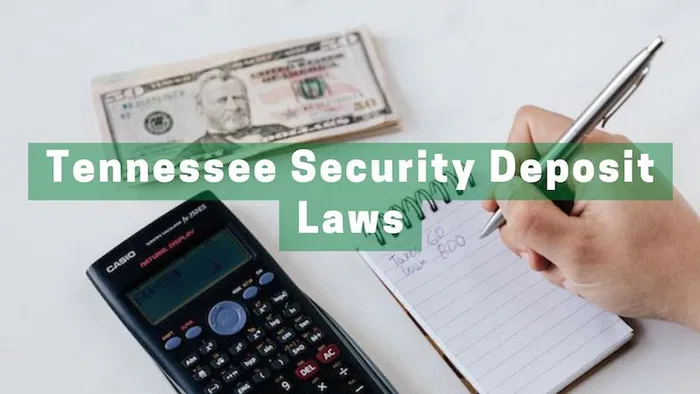RENEW has been a property management company in Nashville for well over a decade now. Because of this, we have become quite familiar with the Tennessee security deposit laws. Under Tennessee security deposit laws, it is lawful for a landlord to collect deposits from a tenant. The deposit owed during the landlord tenant relationship helps protect the property's value. The Tennessee security deposit refers to an amount of money collected from a tenant before the tenant takes possession of the rental unit. In most cases, deposits are refundable.
Collecting a tenant's security payment offers several benefits for the landlord, including the following:
- Deposits can cover unpaid rent: One of the important reasons why a landlord should collect deposits is that they need a cushion in case a tenant refuses to pay their rent. Nonpayment of rent from a tenant is a breach of the rental contract, and it’s a common problem encountered by Tennessee landlords. In case a tenant fails to pay the rent, the landlord can deduct the amount due from the tenant’s security deposit.
- Security deposits can cover the cost of damage to the property: Another benefit of a security payment is that it can be used to cover the cost of damage to the property that is outside the normal wear and tear. The landlord can also charge the damage to the unit that is not found during the inspection if such damage is identified within 30 days after the tenant moves out or within seven days after the new tenant moves in.
- Security deposits can be used to pay any amount due to the landlord: Tennessee landlords can also deduct from the payment any amount due to them by the tenant. For instance, if the residents are liable to pay their own utilities, any unpaid utilities shall be deducted from the security deposit. Also, depending on the lease agreement, the landlord may also deduct any unpaid cleaning costs from the security deposit.
Here’s a Guide to Tennessee’s Security Deposit Law
1. Security Deposit Limit
Most states limit how much a landlord can charge a tenant for a security deposit. In the state of Tennessee, however, there is no maximum limit on the amount of deposit that Tennessee landlords can charge from their residents.
However, there is an exception to this security deposit law. Counties that have a population of less than 75,000 according to the Federal Census are exempted from the Landlord-Tenant Act. If you are not sure if the law applies to your county, it’s best to check your local county or city ordinances to verify if there is a limit on deposit amounts that you are allowed to charge.
2. Additional Pet Deposits
It is lawful for Tennessee landlords to request an additional pet deposit from residents who have pets. If you request an extra pet deposit, ensure to put that notice in the rental agreement. However, keep in mind that people with disabilities who use service animals should have equal and full access to housing.
According to the Federal Fair Housing Act, housing facilities should allow tenants who use service dogs or emotional support animals to have an equal housing opportunity. This means that if your tenant has a disability and your tenant requests a service animal, you may not request him/her to pay any additional deposits or fees.
If the tenant’s disability is not readily apparent or known to the landlord, the Tennessee landlord has the right to ask the tenant to submit reliable documentation of a disability. This also includes any documentation stating the disability-related need for a service animal or support animal. To protect the landlord’s interests, it’s best to include in the rental agreement that the tenant should be liable for any damages caused by the service animal to the rental unit.
3. Nonrefundable Fees
Under Tennessee law, it allows non-refundable fees in the tenant's deposit. In addition, the law does not require Tennessee landlords to disclose any nonrefundable fees to each tenant. However, it is best to include any non-refundable fees in the lease agreement to avoid any problems in the future. If a nonrefundable fee is not clearly stated in the lease agreement, the tenant can possibly demand a refund when the lease term ends.
4. Storing a Tenants Deposit in Tennessee
Under Tennessee landlord tenant law, it is illegal for landlords to mix other funds with their tenants’ security deposits, therefore they must keep it in a separate account. It is imperative for Tennessee landlords to place tenants’ deposits in a separate account used only for this purpose in a bank or other recognized financial institution. Otherwise, landlords may not be allowed to make any deductions from the security deposit.
In addition, Tennessee landlords are mandated to disclose the location of the bank account where the deposit is held. However, landlords don’t need to disclose the account number where the security deposit was held.
5. Written Notice after Security Deposit Receipt
Landlords are not required by Tennessee landlord tenant law to provide a written receipt to tenants for their security deposits.
6. Reasons to Withhold a Tenant’s Security Deposit in Tennessee
Under certain conditions, landlords can keep all or a portion of a tenant’s security deposit. In the state of Tennessee, the following are the allowable deductions:
- Any unpaid rent.
- Cost of damage to the property that’s not part of normal wear and tear.
- Any amount due to the landlord.
Although, in accordance with Tennessee’s renters’ rights concerning security deposits, the landlord cannot keep the deposit to cover conditions that existed before the tenant moved into the rental property.
7. A Walk-Through Inspection
A walk-through inspection is required under Tennessee landlord-tenant law. The inspection helps to check the property's condition. Prior to conducting the inspection, landlords must give the tenant five days' written notice and it should be conducted during normal business hours.
8. Security Deposit Refund in Tennessee
Once the tenant vacated the property, landlords should return the security deposit within 30 days after the tenant leaves or 60 days if the landlord doesn’t not receive a response for the refund. If no response is received from the tenant regarding the refund 60 days after sending the notice, the landlord may keep the remaining security deposit without any further liabilities. If the landlord fails to return the tenants deposit the tenant may pursue legal action.
9. Change in Property Ownership
If the property rented is sold during the lease, the outgoing landlord should do both of the following:
- The old landlord should transfer the security deposit to the new owner, and
- Send a written notice to the tenant regarding the transfer of ownership and of the security deposit
Bottom Line
Hiring a Nashville property manager will take away the stress of owning a rental property. Here at RENEW Real Estate Services, we understand all aspects of the landlord-tenant law, so you don't have to worry. Contact us today to get started!
This blog should not be used as a substitute for legal advice from a licensed attorney in your state. Laws change, and this post might not be updated at the time of your reading. Please contact us for any questions you have in regards to this content or any other aspect of your Nashville property management needs.


